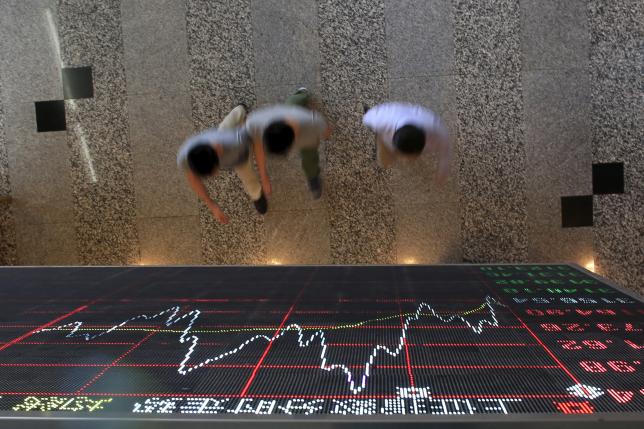China selloff pressure Asia stocks, yuan jumpy before IMF decision
TOKYO: An extended selloff in Chinese stocks pulled down Asian markets on Monday, while the yuan bounced on suspected intervention by Beijing hours ahead of an IMF decision on whether to promote it to a basket of global reserve currencies.
MSCI's broadest index of Asia-Pacific shares outside Japan fell 0.6 percent, and was on course to book a loss of about 2.6 percent for the month of November, after making its first gains in six months in October.
Japan's Nikkei dropped 0.7 percent, though it posted a monthly gain of 3.5 percent.
European shares are seen following suit, with spread betters expecting France's CAC 40 to fall as much as 0.3 percent, and tip 0.2 percent declines each in Germany's DAX and Britain's FTSE.
Mainland Chinese shares were fragile, sliding 3.2 percent at one point, after posting their biggest one-day losses in more than three months on Friday.
Market sentiment remained shaky due to the resumption of IPOs, renewed efforts by the securities regulator to clamp down on leveraged buying and concerns about the cooling economy.
"At the heart of the issue, I think, would be worries that the authorities might be starting to fade out various stock price supporting measures they had started in July," said Naoki Tashiro, the president of TS China Research.
The yuan, expected to get the IMF nod as a reserve currency later on Monday, jumped in offshore trade on suspected intervention by Beijing.
The offshore yuan rose to 6.4345 to the dollar after hitting a 2-1/2-month low of 6.4591 earlier.
The yuan has been hampered by speculation among some analysts that Beijing may allow the yuan to depreciate soon after its admission and may feel less pressure to push through promised reforms.
Investors are also focusing on the ECB's policy decision on Thursday, with growing expectations that it could cut interest rates by 20 basis points.
The euro traded at $1.0581, down 0.1 percent on Monday and 3.8 percent on the month, edging near a seven-month low of $1.0565 touched on Wednesday.
"I think markets have almost priced in the ECB's rate cut and like after its easing in March, the euro is likely to rebound rather than heading towards parity against the dollar," said Tsuyoshi Shimizu, chief strategist at Mizuho Asset Management.
The prospects of an ECB easing also is putting pressure on the central bank of Switzerland, surrounded by euro zone countries, to take similar actions to stem any strengthening in the Swiss franc.
That pushed the franc to a five-year low of 1.0328 franc to the dollar on Friday. It last stood at 1.0316..
In contrast, the dollar is supported as the Federal Reserve is widely tipped to hike US interest rates at its mid-December policy meeting. The dollar index rose to an eight-month high of 100.23.
The yen stood little changed at 122.73 yen, largely shrugging off data showing Japan's industrial output rose slightly less than expected in October.
In commodities, gold licked wounds after Friday's two percent fall that took it to a near six-year low. The yellow metal logged its sixth straight weekly decline on a firm US dollar and prospects of a Fed rate hike next month.
Gold fetched $1,056.00 per ounce, just above Friday's low of $1,053.50.
Oil prices were also lethargic after their falls on Friday. Global benchmark Brent futures dipped 0.4 percent to $44.67 per barrel.






